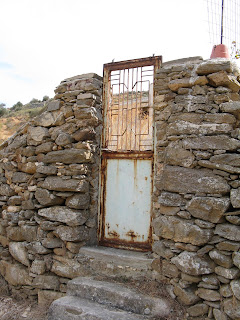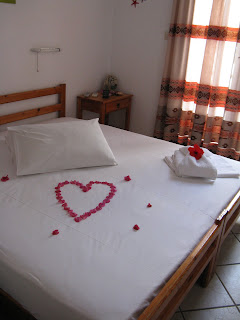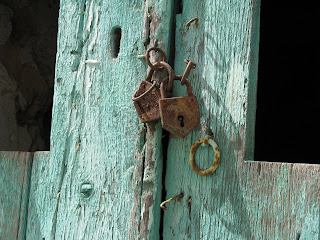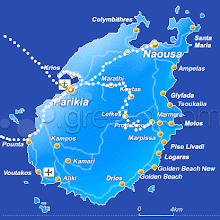 Sunday morning in Paros incense tastes like sweet chalk on my tongue. Myrrh, I think, I am not certain. It is burning fresh in all the small churches throughout the town and the odor falls thick into my mouth.
Sunday morning in Paros incense tastes like sweet chalk on my tongue. Myrrh, I think, I am not certain. It is burning fresh in all the small churches throughout the town and the odor falls thick into my mouth.Seven thirty in the morning church bells call everyone in. I am awake anyway. Sunday is different than the other days, people rest. You can feel the energy settling everywhere.
Smells like Paros... honey, food cooking – grilled meats, garlic, something very sweet, tomatoes. Honeysuckle, but only in the morning. Cigarette smoke doesn’t really bother me, to my surprise.
Sometimes thick diesel fuel and oil, they don’t linger long, carried out to sea with the wind.
 On the waterfront, odors of fish, seaweed and wet wood are stronger.
On the waterfront, odors of fish, seaweed and wet wood are stronger. On one particular Sunday basil bouquets were given out at church coating the streets of Parikia with the scent. In addition to kissing the glass encased photos of the saints in alters of the Panagia Ekatonadapyliani Church, the people wave herbal bouquets over each sacred icon. It is a lot of work, a lot of attention. People, other than me know what to do; I feel like a voyeur.
On one particular Sunday basil bouquets were given out at church coating the streets of Parikia with the scent. In addition to kissing the glass encased photos of the saints in alters of the Panagia Ekatonadapyliani Church, the people wave herbal bouquets over each sacred icon. It is a lot of work, a lot of attention. People, other than me know what to do; I feel like a voyeur.
Bus tickets to Lefkes are available in the mini-market. In Prodromos, at the bakery. In Naousa you pick them up at the newsstand with the red awning around the corner from the main square. You have to know it already or you must ask to find out; the rare signs in English are sometimes hidden and written in small letters. The Greek word for bus stop is easy to spot now.

Things make sense in Greece when one is patient and waits for the big picture to reveal itself. Things do not make sense when we are impatient, filled with expectation. It is simple.
There is a remedy for confusion about situations, just shrug your shoulders and give it over to fate. Why? is unimportant - so much of the time. Things just are the way they are and need little explanation, it fits. There is a lot of acceptance for certain things here.
Many would agree, not just Greeks.
The other day I told a few people I had not slept the night before and found out none of them had either. Interesting, so we all thought; energy is so easily shared on the island. It was in the air, we speculated, needing nothing more than that to appease us. There is no point in creating reasonable reasons for answerless questions. False satisfaction does not play well here.
It is a half hour bus ride from Parikia to Lefkes which is located in the middle of the island and on top of a mountain. The bus cuts inward away from the sea. Many Germans are on this ride with me, I understand more of their conversations than I would have quessed.
The Greek man is snoring but no one bothers him or even laughs. I sneak a photograph though, and hope no one is watching.

Christina told me about the Byzantine Route from Lefkes to Marpissa on the east of the island. She said I can walk the path down and then take the bus back around to Parikia in the west. She left out the length of the trail. Six kilometers feels like fifty miles wearing New York style flip-flops on rocky, uncertain terrain. Unprepared with the footwear, I am still reliable in many ways. Midday hot; I like it.

Like so many other towns here, Lefkes has a main street for vehicles to drive along and the winding, turning paths lined with homes are all pedestrian-only walkways. Houses are built up the side of the hill, into crevices, into the countryside. Sinuous ramped stone streets break into unexpected turns. I get mixed up and find myself passing by the same homes, stores, cats, several times before finding the route again.
 The man kicking the fig down the street smiles at me. Signs are posted sporadically; maybe it is the same sign I saw before.
The man kicking the fig down the street smiles at me. Signs are posted sporadically; maybe it is the same sign I saw before.  Pristine whitewashed houses abut long ago deserted homes with broken roofs where birds now take up residence. As I come closer I hear the nervous flutter of winds inside.
Pristine whitewashed houses abut long ago deserted homes with broken roofs where birds now take up residence. As I come closer I hear the nervous flutter of winds inside. 
The Byzantine Route starts in the village of Lefkes and finishes down the mountain. No living civilization after I leave the town until Prodromos six kilometers later. The route continues after Prodromos to Marpissa and Marmara, by then the terrain is relatively flat.
 I keep following the signs through the village which eventually open up to the path proper. A dirt road flanked by stone walls on either side leading out into the hillside and far away from Lefkes.
I keep following the signs through the village which eventually open up to the path proper. A dirt road flanked by stone walls on either side leading out into the hillside and far away from Lefkes. 
Proud enough to have found it, I think nothing of starting out. Without the Scarecrow or Toto, I am reciting my numbers in Greek for practice. I can make it to forty-nine now without a problem. Still using time wisely.

They are panting when we meet because of the steep uphill climb. We exchange information about how far we’ve come from in either direction. They tell me twenty minutes more for me before Prodromos. I point to my feet to show them the insufficient footwear instead of regulation hiking shoes each of them is sporting. I should be grateful that this flimsy pieces of rubber have lasted this long. The man changes his estimation for me to forty minutes to the town. When I explain my foolishness for wearing these shoes he says, "Because you are young, so it will be okay."
I consider moving to Paris to live with them forever as I watch the quartet leave me to continue up the hill to Lefkes.

It is all ruins of ancient stone buildings that had been abandoned long ago and a path that has been trod on for thousands of years. For some stretches, stone walls flank each side of the path. Every piece of slate was carried up individually and laid down specifically; so much of it remains. There is determination here; silence and space.

Arriving in the town is uneventful despite having made it in these shoes. Prodromos is observing afternoon siesta and no one is around. Three cats sunbathing in the road almost look at me; the calico opens his left eye when I come close but then returns to napping. And the goats, they never stop chewing. Dogs, as usual, asleep in the shade.
I would not have thought I had the courage to hike a long trail like this alone. I had convinced myself long ago that silence and isolation in remote places are adversaries. There is plenty of solitude on the Byzantine Route, but no fear. Not even a mosquito to worry about.


 Saturday, one twenty in the afternoon. Church bells ringing slow and somber because someone has died. They sound bottomless and important. A nearby gong…then the echo… pause… gong… echo again… silence. In the distance the same sound only far away. It may be that I hear chanting too, I’m not sure. This goes on for five minutes, maybe more.
Saturday, one twenty in the afternoon. Church bells ringing slow and somber because someone has died. They sound bottomless and important. A nearby gong…then the echo… pause… gong… echo again… silence. In the distance the same sound only far away. It may be that I hear chanting too, I’m not sure. This goes on for five minutes, maybe more. We have been expecting the rain. It is the first rain in five months. On the beaches a trench has been dug to pull the runoff from the streets into the sea. People have to think like that here or businesses will be destroyed.
We have been expecting the rain. It is the first rain in five months. On the beaches a trench has been dug to pull the runoff from the streets into the sea. People have to think like that here or businesses will be destroyed.
 Yesterday, Peter offered me a lift.
Yesterday, Peter offered me a lift.






 On Sunday mornings the sound of religious services echoes from the churches.
On Sunday mornings the sound of religious services echoes from the churches.
 "You are lost in Paros." Frank says, he is certain. He says it as if it is as true as sunrise.
"You are lost in Paros." Frank says, he is certain. He says it as if it is as true as sunrise.





